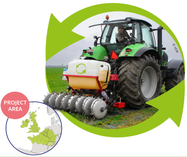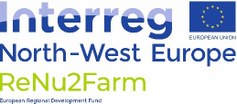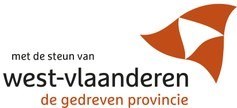Interreg North West Europe - ReNu2Farm
Introduction
ReNu2Farm (Nutrient Recycling – from pilot production to farms and fields) aims to replace a percentage of traditional mineral N, P, K containing fertilizers with recycling-derived fertilizer products and to scale this up from pilot stage to full scale production. The ReNu2Farm project brings together 10 partners from 5 European countries. The project is coordinated by IZES gGmbH (contact via Katharina Laub) and will run from 20/09/2017 until 19/12/2020.
Description
The ReNu2Farm project aims at increasing recycling rates of the plant nutrients Nitrogen (N), Phosphorus (P) and Potassium (K). P and K are limited and finite resources, and production of N fertilizers is energy intensive. Despite recovery technologies having been developed, the use of recycling-derived fertilizer products by farmers is limited until now. The barriers for the limited use will be overcome. Selected countries are IE-UK, DE-NL and BE-FR. Within these countries, regions with nutrient shortage and surplus can be distinguished. Possibilities for exchange of recycled nutrients between regions will be explored and producer-consumer collaboration developed. Upcycling nutrients in surplus regions to mineral fertilizer quality (according to farmers’ needs) will create demand in nutrient-demand regions in NWE. By developing transnational markets and by communicating policy advice, market barriers will be reduced. This will result in replacing mineral fertilizer amounts with recycling-derived products by the end of the project (-54,000 t N, -4,000 t P, -60,000 t K). The 3 largest waste streams (sewage sludge, food waste and manure) will be considered and in an enterprise-academia cooperative monitoring processes, 20 producers will succeed to improve 17 recycling-derived fertilizer products' properties according to end-user needs. Development of transnational trade chains will facilitate 20 enterprises to introduce new-to market recycling fertilizer products. In bottom-up cooperation with farmers, 8 farm enterprises will host demo fields and thus receive training. The knowledge transfer extents with demo events to members of 10 farmers’ organizations. Farmers knowledge lack barrier is decreased and with transnational trade chains being developed, raw material nutrient use decreases. Due to communication to stakeholders (producers and farmers) (publications in magazines/ internet; workshops) 2% (-108,000 t N, -8,000t P, -120,000t K) of mineral fertilizer amounts will be replaced with recycling-derived products after 5 yrs and 6% (-324,000t N, 24,000t P, 360,000t K) after 10 yrs. Farmers’ organizations and fertilizer producer branch organizations as associate partners ensure long term implementation.
Objectives
These are the objectives of ReNu2Farm:
• Improve recycling-derived fertilizers to meet agronomic needs
• Farmers use more recycling-derived fertilizers instead of mineral fertilizer
• Increase in trade and transport of recycled nutrients
Role of Ghent University
The Laboratory of Analytical Chemistry and Applied Ecochemistry (UGhent-Ecochem) will take part in the three work packages (WP) of the ReNu2Farm project. The WP1 is led by UGhent-Ecochem and it focuses on production and logistics of recycling-derived fertilizers by implementing nutrient recovery vis-à-vis desired end-user requirements. The role of UGhent-Ecochem in WP1 is to perform process flow analysis of production chains put in place for nutrient recovery from wastes as well as in product characterization and quality assessment of recovered nutrients in WP1. The WP2 is focused on agro-ecological assessment of recycling-derived fertilizers. In this WP, the UGhent-Ecochem will carry out an environmental risk assessment in terms of nutrient balances and CO2 footprint in cooperation with Inagro. The WP3 aims to develop a market introduction strategy by analyzing market structure and current legal framework. As a coordinator of Biorefine Cluster Europe, the UGhent-Ecochem has an extensive network of institutes, companies, administrations and CSOs concerned in nutrient recovery and recycling. This network will be used while analyzing legislative framework conditions and holding stakeholder workshops with policy makers, which are UGhent-Ecochem tasks in WP3.
Dutch summary
Het doel van het project is om het hergebruik van de plantenvoedingsstoffen stikstof (N), fosfor (P) en kalium (K) te verhogen. P en K zijn eindige grondstoffen en de productie van N-kunstmest vraagt veel energie. Ondanks dat technieken voor herwinning zijn ontwikkeld, is het gebruik van meststoffen uit recycling door boeren tot nu toe beperkt. De belemmeringen hiervoor worden weggenomen. Geselecteerde landen zijn IE-UK, DE-NL en BE-FR, waarbinnen regio’s met een nutriënten-tekort en -overschot worden onderscheiden. Mogelijkheden voor uitwisseling van gerecyclede nutriënten tussen regio’s worden verkend en samenwerking tussen producenten en consumenten opgezet. Opwaardering van nutriënten tot een kwaliteit gelijkwaardig aan minerale meststoffen, zal bij boeren in tekort-regio’s in NWE een vraag creëren. Door het ontwikkelen van internationale markten en door voorlichting richting beleid, worden marktbelemmeringen weggenomen. Dit zal aan het eind van het project resulteren in vervanging van minerale meststoffen (-54,000 t N, -4,000 t P, -60,000 t K in meststoffen) door producten uit recycling. In een samenwerkingsverband tussen bedrijven en onderzoeksinstellingen, worden de 3 grootste afvalstromen (zuiveringsslib, voedselresten en mest) beschouwd. Daarbij zullen 20 producenten er in slagen om de eigenschappen van 17 meststoffen uit secundaire stromen te verbeteren zodat ze beter aansluiten bij de wensen van eindgebruikers. De ontwikkeling van internationale handelsketens zorgt er voor dat 20 bedrijven nieuwe meststoffen uit secundaire stromen op de markt kunnen brengen. In een samenwerking met betrokken boeren, worden er demovelden aangelegd bij 8 landbouwbedrijven, die daarvoor training ontvangen. De kennis wordt via demo-bijeenkomsten overgedragen naar leden van 10 boerenorganisaties. De kennislacune bij boeren wordt verminderd en met de 20 internationale handelsketen die wordt ontwikkeld, wordt het gebruik van traditionele minerale meststoffen verminderd. Door communicatie (vakbladartikelen, internet en workshops) naar stakeholders (producenten en boeren) zullen na 5 jaar 2% (-108,000 t N, -8,000t P, -120,000t K) van de minerale meststoffen worden vervangen door producten uit recycling en na 10 jaar 6% (-324,000t N, 24,000t P, 360,000t K). Boerenorganisaties en betrokken partners zorgen voor implementatie op de lange termijn.
Website
Interreg ReNu2farm
Biorefine ReNu2farm
Contact
Prof. Dr. ir. Erik Meers
Department of Green Chemistry and Technology
Phone number: 0032 9 264 60 94
E-mail
This project has received funding from the Interreg North West Europe programme 2014-2020 co-funded by the European Regional Development Fund. The project is also co-funded by the Province of West-Flanders and VLAIO.



